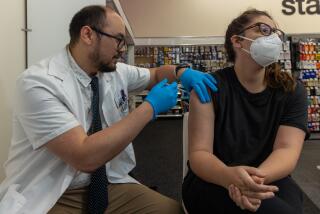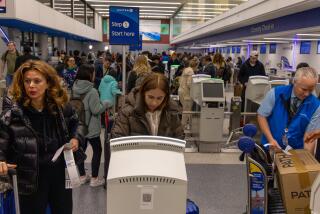Is SARS still an issue?
- Share via
Less than three months after the World Health Organization said SARS had been contained worldwide, a case of severe acute respiratory syndrome has surfaced in Singapore, where a 27-year-old laboratory worker tested positive earlier this month.
The case, verified by the U.S. Centers for Disease Control and Prevention, is thought to be isolated and may have been contracted in a laboratory, WHO officials said. Singapore continues to be a safe destination, they said.
Even so, public health officials are urging travelers not to let SARS fall off their radar this winter and to take preventive measures if they are planning to travel to areas where SARS has been a problem.
When the pneumonia-like illness appeared late last year in China, it was thought to be a new coronavirus, associated with the common cold and other respiratory illnesses, that jumped from animals to humans. It then traveled swiftly to 30 countries, infecting more than 8,400 people and killing 916 as of Aug. 7, when the WHO issued its last major summary of the epidemic. That was about a month after it announced that SARS had been contained worldwide. (See www.who.int.)
The good news about containment has been tempered by sobering warnings from experts that the illness may never be eradicated and could become a seasonal threat, reappearing much as influenza does.
Los Angeles area doctors say some Americans have become complacent about the risk since the height of the outbreak, when nightly newscasts showed crowds in Asian cities wearing masks, and they urge travelers not to let down their guard.
“People become very numb to the news alerts, especially when not much is happening here,” says Dr. Terri Rock, a Santa Monica physician specializing in travel medicine.
The U.S. reported 33 probable SARS cases, none resulting in death, according to the WHO. Canada, particularly Toronto, was harder hit, with more than 250 cases and 43 deaths nationwide.
But it was Asia that suffered the most. In Singapore, Hong Kong, Taiwan and mainland China, 7,985 cases were reported and 862 people died as of Aug. 7.
Although public health officials don’t see cause for alarm with the latest probable SARS case in Singapore, they do urge travelers to take precautions.
The WHO recommends flu vaccine for high-risk groups such as the elderly and anyone with a weakened immune system or chronic disease. These people are more likely to suffer flu complications such as pneumonia.
Dr. Howard Lehrhoff, assistant clinical professor of medicine at UCLA’s David Geffen School of Medicine and medical director of a travel medicine clinic in Pacific Palisades, goes further.
“I recommend people planning to travel to areas where SARS was a problem to consider getting flu vaccine” regardless of their age or physical condition, Lehrhoff says.
Flu vaccine won’t protect against SARS, but it can reduce the number of non-SARS-related pneumonia cases. That’s key in identifying another SARS outbreak, the WHO says, because health-care personnel trying to identify SARS cases will be burdened with fewer non-SARS pneumonia patients.
The flu vaccine also will reduce travelers’ chances of becoming ill during a trip and perhaps being detained by security officials on the lookout for SARS, Lehrhoff says.
CDC spokesman Llelwyn Grant urges travelers to take common-sense precautions.
“Practice good hygiene,” he says. That means washing hands frequently and using an alcohol-based hand cleaner if soap and water aren’t available.
Avoiding close contact with large crowds also can reduce risk, Grant says. The disease is transmitted mainly by close person-to-person contact, the CDC says, but it also can spread when people touch objects contaminated with the virus, then touch their mouths, eyes or noses. Lehrhoff advises travelers not to share eating utensils or anything else that might have another person’s respiratory secretions.
Knowing the symptoms also helps. A fever of more than 104 is often the first sign. Headaches and body aches are also common, and a dry cough can develop. Anyone who develops these symptoms should seek immediate medical attention.
Kathleen Doheny can be reached at kathleendoheny @earthlink.net.
More to Read
Sign up for Essential California
The most important California stories and recommendations in your inbox every morning.
You may occasionally receive promotional content from the Los Angeles Times.










